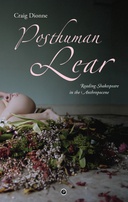Explore

Posthuman Lear: Reading Shakespeare in the Anthropocene
Craig Dionne
2016
0 Ungluers have
Faved this Work
Login to Fave
Approaching King Lear from an eco-materialist perspective, Posthuman Lear examines how the shift in Shakespeare’s tragedy from court to stormy heath activates a different sense of language as tool-being — from that of participating in the flourish of aristocratic prodigality and circumstance, to that of survival and pondering one’s interdependence with a denuded world. Dionne frames the thematic arc of Shakespeare’s tragedy about the fall of a king as a tableaux of our post-sustainable condition. For Dionne, Lear’s progress on the heath works as a parable of flat ontology.At the center of Dionne’s analysis of rhetoric and prodigality in the tragedy is the argument that adages and proverbs, working as embodied forms of speech, offer insight into a nonhuman, fragmentary mode of consciousness. The Renaissance fascination with memory and proverbs provides an opportunity to reflect on the human as an instance of such enmeshed being where the habit of articulating memorized patterns of speech works on a somatic level. Dionne theorizes how mnemonic memory functions as a potentially empowering mode of consciousness inherited by our evolutionary history as a species, revealing how our minds work as imprinted machines to recall past prohibitions and useful affective scripts to aid in our interaction with the environment. The proverb is that linguistic inscription that defines the equivalent of human-animal imprinting, where the past is etched upon collective memory within ‘adagential” being that lives on through the generations as autonomic cues for survival.No doubt the book wears a geographical and discursive motley because of the context of its making, being a product of an overseas sabbatical year in Tokyo. Reading Shakespeare’s King Lear while sitting under three tiers of incessantly busy freeway overpasses in one of the world’s most densely populated cities, in a sea of Roppongi neon and 50-foot live-feed Sony ads, where Japan’s techno-futurism sounds over the wave of urban commuters dressed in the weird nostalgia that defines Tokyo fashion — sleek faux-50s-American business suits or the cosplay of Lolita teeny bop dyed hair — all the while a few miles north, the Fukushima nuclear power plant silently leaks radiation into the Pacific. Lotus eaters lost in the funhouse? Or survivors clinging to outmoded rituals in the face of madness? In this context, reading for the kernel of Shakespeare’s philosophy of the human in his great tragedy can feel a bit unsettling, like that of a posthuman Rorschach test. (Or a bad acid trip flashback of a Rorschach test). No excuse, I suppose, but in this setting the interpretation of cosmic decay and ecological catastrophe in Shakespeare’s great tragedy does not feel necessarily forced. Only suspiciously apparent.Dionne’s reimagining of this tragedy is important in the way it places Shakespeare’s central existential questions — the meaning of familial love, commitments to friends, our place in a secular world — in a new relation to the main question of surviving within fixed environmental limits. Along the way, Dionne reflects on the larger theoretical implications of recycling the old historicism of early modern culture to speak to an eco-materialism, and why the modernist textual aesthetics of the self-distancing text seems inadequate when considering the uncertainty and trauma that underscores life in a post-sustainable culture. Dionne’s final appeal is to “repurpose” our fatalism in the face of ecological disaster
This book is included in DOAB.
Why read this book? Have your say.
You must be logged in to comment.
Rights Information
Are you the author or publisher of this work? If so, you can claim it as yours by registering as an Unglue.it rights holder.Downloads
This work has been downloaded 393 times via unglue.it ebook links.
- 50 - pdf (CC BY-NC-SA) at OAPEN Library.
- 202 - pdf (CC BY-NC-SA) at Unglue.it.
Keywords
- Anthropocene
- Literary Criticism
- Literary studies: c 1500 to c 1800
- Literary studies: general
- Literature & literary studies
- Literature: history & criticism
- Posthumanism
- thema EDItEUR::D Biography, Literature and Literary studies::DS Literature: history and criticism::DSB Literary studies: general
- William Shakespeare
Links
DOI: 10.21983/P3.0133.1.00Editions

